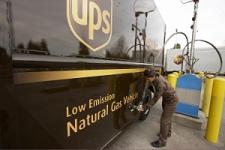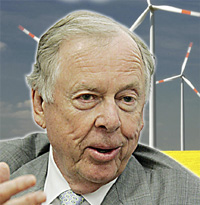 Shipping giant UPS, affectionately known as Brown, is doing its best to be known for its GREEN practices.
Shipping giant UPS, affectionately known as Brown, is doing its best to be known for its GREEN practices.
The company has announced it is adding 167 compressed natural gas (CNG) powered delivery trucks to the roads in Texas, Georgia and California as part of its global alternative fuel fleet, designed to cut down on the company’s carbon footprint and its reliance on dependence on fossil fuels:
 Of the 167 new CNG trucks, 25 have been deployed in Dallas; 42 in Atlanta, and the remaining 100 in five California cities: 30 to Sacramento, 14 to Los Angeles, five to Ontario, 10 to San Ramon and 41 to Fresno. They join more than 800 CNG vehicles already in use by UPS in the United States. Previous CNG vehicles in UPS’s fleet were converted from gasoline and diesel vehicles in the 1980s to run on alternative fuels. The new vehicles are originally manufactured for alternative fuel use.
Of the 167 new CNG trucks, 25 have been deployed in Dallas; 42 in Atlanta, and the remaining 100 in five California cities: 30 to Sacramento, 14 to Los Angeles, five to Ontario, 10 to San Ramon and 41 to Fresno. They join more than 800 CNG vehicles already in use by UPS in the United States. Previous CNG vehicles in UPS’s fleet were converted from gasoline and diesel vehicles in the 1980s to run on alternative fuels. The new vehicles are originally manufactured for alternative fuel use.
“UPS has deployed alternative fuel vehicles for more than 70 years and this CNG deployment is one more step towards the ‘greening’ of the UPS fleet,” said Robert Hall, UPS’s director of vehicle engineering. “Continuing to add CNG delivery trucks to our fleet is a sustainable choice because natural gas is a cost effective, clean-burning and readily available fuel.”
The CNG truck bodies are identical externally to the signature-brown trucks that now comprise the UPS fleet although they will be marked as CNG vehicles. The trucks are expected to reduce emissions by 20 percent and improve fuel economy by 10 percent compared to the cleanest diesel engines available today.
The press release goes on to say that this brings the UPS “green fleet” up to 1,629 trucks, using CNG, LNG (Liquefied Natural Gas), propane, electric and hybrid electric vehicles worldwide… the largest alternatively-fueled private fleet in the transportation industry.
 According to the Kalamazoo Gazette, a group of Western Michigan University researchers gave U.S. Senator Carl Levin (D-MI) a presentation of their ideas last week.
According to the Kalamazoo Gazette, a group of Western Michigan University researchers gave U.S. Senator Carl Levin (D-MI) a presentation of their ideas last week.

 Driver Ryan Hunter-Reay ran a great race and stayed in the top ten with all the big name drivers for the majority of the race. The 2007 Rookie of the Year was hoping for a better finish for the start of his first full season with the Indy Car Series, but he got passed up by two drivers in the final restart of the race after Tony Kanaan got knocked out of first place. Before the restart, the #17 Ethanol car was holding on to fifth place. The Homestead 300 trophy ultimately went to Scott Dixon.
Driver Ryan Hunter-Reay ran a great race and stayed in the top ten with all the big name drivers for the majority of the race. The 2007 Rookie of the Year was hoping for a better finish for the start of his first full season with the Indy Car Series, but he got passed up by two drivers in the final restart of the race after Tony Kanaan got knocked out of first place. Before the restart, the #17 Ethanol car was holding on to fifth place. The Homestead 300 trophy ultimately went to Scott Dixon. Officials with the Food and Agricultural Policy Research Institute say biofuels will drive agriculture for at least the next 10 years.
Officials with the Food and Agricultural Policy Research Institute say biofuels will drive agriculture for at least the next 10 years. The 79-year-old multi-billionaire was on CNBC earlier this week talking about energy, oil prices and ethanol. According to
The 79-year-old multi-billionaire was on CNBC earlier this week talking about energy, oil prices and ethanol. According to  Classic Chevrolet/HUMMER spent more than $500,000 to install nine pumps dedicated to E85, E10 and biodiesel at its new Classic Clean Fuels station.
Classic Chevrolet/HUMMER spent more than $500,000 to install nine pumps dedicated to E85, E10 and biodiesel at its new Classic Clean Fuels station. “Classic Chevy has taken a true leadership role by making E85 and other biofuels available to the citizens of Grapevine and allowing all customers who purchase a flex fuel vehicle to drive off with a full tank of E85,” said Karl Doenges, president of CleanFUEL Distribution. “Classic Chevy has gone a step further and configured their station so all municipal, county, state and federal fleets around the Grapevine-DFW Airport area can seamlessly use this site with their existing fleet management program. Everyone can now do their part for energy independence, the environment and growing our economy.”
“Classic Chevy has taken a true leadership role by making E85 and other biofuels available to the citizens of Grapevine and allowing all customers who purchase a flex fuel vehicle to drive off with a full tank of E85,” said Karl Doenges, president of CleanFUEL Distribution. “Classic Chevy has gone a step further and configured their station so all municipal, county, state and federal fleets around the Grapevine-DFW Airport area can seamlessly use this site with their existing fleet management program. Everyone can now do their part for energy independence, the environment and growing our economy.”  Shipping giant UPS, affectionately known as Brown, is doing its best to be known for its GREEN practices.
Shipping giant UPS, affectionately known as Brown, is doing its best to be known for its GREEN practices. Of the 167 new CNG trucks, 25 have been deployed in Dallas; 42 in Atlanta, and the remaining 100 in five California cities: 30 to Sacramento, 14 to Los Angeles, five to Ontario, 10 to San Ramon and 41 to Fresno. They join more than 800 CNG vehicles already in use by UPS in the United States. Previous CNG vehicles in UPS’s fleet were converted from gasoline and diesel vehicles in the 1980s to run on alternative fuels. The new vehicles are originally manufactured for alternative fuel use.
Of the 167 new CNG trucks, 25 have been deployed in Dallas; 42 in Atlanta, and the remaining 100 in five California cities: 30 to Sacramento, 14 to Los Angeles, five to Ontario, 10 to San Ramon and 41 to Fresno. They join more than 800 CNG vehicles already in use by UPS in the United States. Previous CNG vehicles in UPS’s fleet were converted from gasoline and diesel vehicles in the 1980s to run on alternative fuels. The new vehicles are originally manufactured for alternative fuel use.
 According to the companies, “the sugars can be sourced from non-food sources like corn stover, switch grass, wheat straw and sugarcane pulp, in addition to conventional biofuel feedstock like wheat, corn and sugarcane.”
According to the companies, “the sugars can be sourced from non-food sources like corn stover, switch grass, wheat straw and sugarcane pulp, in addition to conventional biofuel feedstock like wheat, corn and sugarcane.”  The
The  The Corvette Racing C6.R driven by Johnny O’Connell, Jan Magnussen and Ron Fellows captured ninth overall and first in the 12 hours of Sebring in Florida, the season opener for the American Le Mans Series.
The Corvette Racing C6.R driven by Johnny O’Connell, Jan Magnussen and Ron Fellows captured ninth overall and first in the 12 hours of Sebring in Florida, the season opener for the American Le Mans Series.